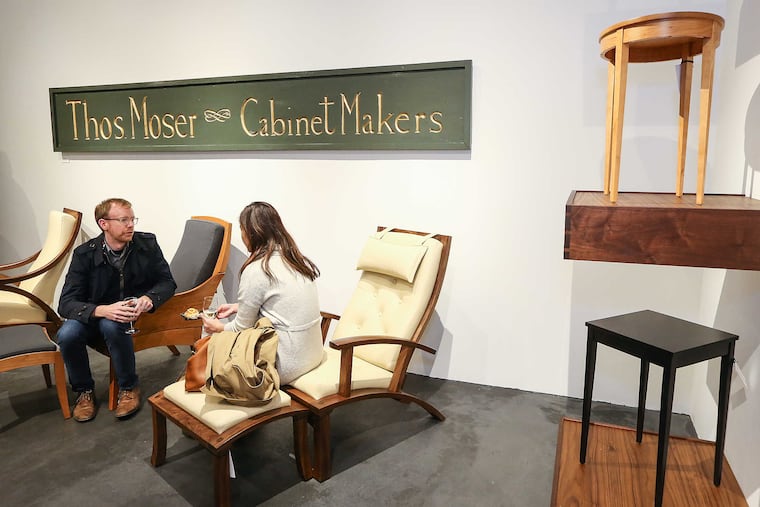Thos. Moser goes modern with city's millennials and empty nesters
Tom Moser, founder of the high-end furniture-maker that bears his name, joked about how little he knew of the mysterious millennials who pack the Apple store next to his new showroom on pricey Walnut Street.

Tom Moser, founder of the high-end furniture-maker that bears his name, joked about how little he knew of the mysterious millennials who pack the Apple store next to his new showroom on pricey Walnut Street.
"I don't know what millennials do, what they want, or what their tastes are," Moser, 81, said to a crowd he had in stitches at the store's grand opening party Thursday. "As far as I know, millennials don't want anything except experiences.
"They don't want Waterford crystal. They don't want silverware. I'm not sure they want furniture," he said. "But to the extent that there's a lot of traffic over there, it can't hurt us."
Moser is more certain that Center City Philadelphia is on a roll and that's why his store has come back there, opening to the public on Friday.
"You have all these cranes going up," he said in the 2,900-square-foot store as he mingled with guests and longtime customers. "There's a renaissance going on here, and it's fairly new."
Numbers tell part of the story:
Center City's population rose by 29 percent between 1990 and 2010, census records show. By comparison, the Philly metro area as a whole grew only 10 percent over the same period.
"Just like when housing tracts come to the suburbs, the conveniences of everyday life will need to satisfy this growing urban population," said Steven H. Gartner, CBRE Inc.'s managing director for retail services. "This includes groceries, restaurants, fitness options, and other services, but all repackaged for an urban dweller that lives in smaller quarters and shops quite differently."
The estimated population for Center City is forecasted to grow 4.9 percent by 2020, adding more than 3,000 residents, according to a 2015 CBRE report. It projected the city's stock of condo and apartment units would swell to 35,000 by 2019, up 7,000 from 2000.
Aaron Moser, 54, the founder's son who became president and CEO two months ago, said the furniture-maker wants to furnish them.
"We're here to capture some of these fancy condos and people living in these modern high-rises," he said. "You see a new, modern look for Moser."
And that's why it secured 1605 Walnut St. - among Center City's most expensive rental blocks. Walnut from 15th to 17th Streets has emerged as the most expensive strip for retail rents.
With demand surging over the last three years, landlords were able to fetch up to $160 per square foot in June for that corridor. Walnut Street is known in the retail industry as a "High Street" since it attracts luxury and upscale brands.
Other recent arrivals to Walnut Street with New York flagships include the eyewear company Warby Parker and the fashion brand Rag & Bone, both set to open by year's end.
Tom Moser, who founded the company in 1972, recalled how in 1984 he decided to move one of his showrooms out of Maine to Philadelphia. He set up shop in the art-deco N.W. Ayer building on Washington Square.
"Things were hard in the city in 1984," he said, recalling the homeless he saw living in cardboard boxes.
Thos. Moser remained at that address until 1994, before relocating just off Rittenhouse Square, where it stayed until 1997.
"Then we moved to Washington [D.C.] and San Francisco," he said. "Then we went dark for several years before moving out to Wayne on the Main Line."
Since 2011, it has had a location at 625 W. Lancaster Ave. That closed in August to make way for Moser's return downtown.
"It was pretty much agreed that we were going to come back to Center City," Moser said. "There is a certain dynamism that you can feel when you're around here. Building cranes, high-rises, young people."
There are also Thos. Moser stores in New York City, Boston, Washington, and San Francisco, all places with a lot of high-end residential construction, just like Center City.
"Thos. Moser's return to Center City is a direct correlation to the historic residential-property boom," said Chris Shenian, who brokered the deal on behalf of Moser. "In the past their clientele might have been in the Rittenhouse, Society Hill, and Chestnut Hill area, but today there are gentrified neighborhoods sprouting throughout the city that are their targeted clientele."
Washington Square resident Mary Brown approached Moser at the party and told him the first piece of furniture she bought with her husband of 35 years was a Thos. Moser cherry wood coffee table.
"We still have it," Brown said, as she shook Moser's hand.
Without missing a beat, Moser asked: "And the marriage is still holding?"
Brown, who lives in the N.W. Ayer building, nodded and smiled. "Now, we have a beautiful Edo cherry wood dining table and a Vita cherry wood bed." (Both collections are sold in Thos. Moser stores.)
The company boasts it takes on average three months to handcraft a piece from the finest Native American hardwoods. It has made several pieces for the Bush family. Other customers have included Olympic swimmer Michael Phelps and the late Steve Jobs.
Last year it made the wooden chairs that Pope Francis used at Independence Hall and at Philadelphia International Airport during his visit.
That same chair - known as a Harpswell - is prominently displayed on the storefront facing Walnut Street.
"You're not buying furniture," Tom Moser said. "You're buying a crafted object that you'll hand down to your grandchildren."
215-854-4184@SuzParmley